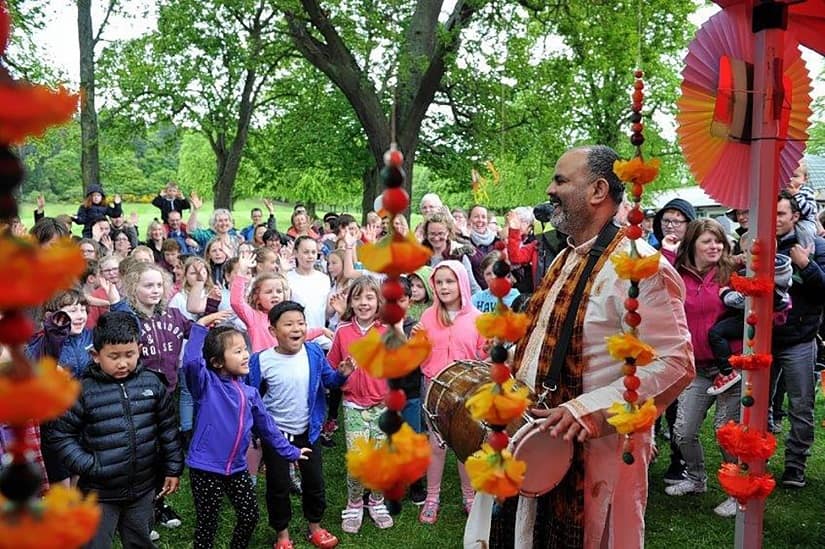One of Europe’s most renowned storytellers, Peter Chand performed alongside a slew of other artists at the Kathakar International Storytellers Festival, at Delhi’s Indira Gandhi National Centre for the Arts over 1-3 December. He spoke with us about his rare form of storytelling, the stories he likes to tell and his journey as a storyteller. Tell us how you became a storyteller. In Britain, we are fortunate to have over 60 storytelling clubs where people meet (usually monthly) and adults share stories with other adults. Some are run purely as open mic nights where anyone can share a story and gain experience, while others combine these with performance evenings by professional storytellers. I was taken to one of these clubs in Shropshire some 18 years ago, and it changed my life completely. I have now been a full-time storyteller for almost 12 years and been fortunate enough to have performed and led workshops in places as far afield as Singapore, Greece, France, Norway, Austria, Canada and Cyprus. [caption id=“attachment_4240511” align=“alignnone” width=“825”]  Peter Chand[/caption] Yours is a unique form of storytelling. How does it work? I tell traditional stories from my Indian background, including many which I have collected from family in Punjab, translated into English and then shared with audiences of all ages around the world. Born and raised in Britain, after my parents migrated from India in search of a better life, I am only one of a handful of Indian storytellers currently based in Britain. My performance style is a unique blend of my Indian heritage and British upbringing. As I do not write down most of my stories, they change with each telling, keeping to the basic and implicit tradition of oral storytelling. Tell us more about the fantastic tales from the subcontinent that you tell. The Indian stories I tell vary greatly depending on the age of my audience. Most people are surprised when they hear that almost half of my storytelling work involves adult audiences; many people still believe storytelling is exclusively for children. For younger audiences, I tell a lot of fast, snappy tales including lots of call and response and repetition. For adults, the pace tends to slow somewhat, and the themes are generally more mature and often darker. What are the advantages and challenges of a performing art of this kind? The plus points of this performing art are many — the connection with an audience is instantaneous. Storytelling is also a great medium to explore diverse cultures, ideas and traditions. Also, I find that one story usually leads to another, so many listeners feel inclined to share their own stories with you, and a dialogue ensues. Storytelling is a great means of bridge-building between people. The challenges include competing for attention against a multitude of other spoken word art forms — both live and digital — we storytellers need to constantly up our game to keep up! Some storytellers could also benefit from learning more about the traditions and context of stories as opposed to focusing primarily on the performance aspect. As the renowned storyteller Shonaleigh often says, “One person’s myth is another person’s religion.” Tell us about the workshops, festivals and community-based projects that you are involved with. I lead workshops based on storytelling techniques for teachers, librarians, storytellers and tour guides among others. These workshops teach a variety of skills from movement to use of voice and making a story your own. Within the wider community I have led many projects based around storytelling and oral history. These usually lead to an archive of some kind — whether a work of art, a book, a performance or a digital archive. Over the years, I have worked with a range of groups including refugees and asylum seekers, the Muslim Association of Britain, organisations for the blind, prisoners, university students, corporate clients and trainee teachers. My most recent community project is Tongue Tied & Twisted, a performance created from traditional Indian stories we collected and recorded from South Asian elders in England. Many of these elders had not shared these old stories for over fifty years, and now they are being told again. They are also included in a digital archive, in both English and the original Indian language in which they were shared with us. Apart from this, I am also one of the organisers of Festival at the Edge Storytelling festival (20-22 July 2018) which is the oldest event of its kind in England. This three-day festival is held on a lake and has some of the finest storytellers and musicians from Britain and beyond, combined with workshops, open mic story rounds, a children’s marquee and dance sessions. Next year’s guests include Shonaleigh, Christine McMahon and Len Cabral from the US, Steve Lally from Ireland, and Daniel Morden from Wales, plus others.
Peter Chand speaks with us about his rare form of storytelling, the stories he likes to tell and his journey as a storyteller
Advertisement
End of Article


)



